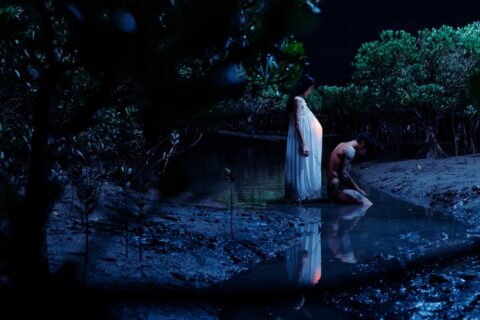In Eel (2025), promising debut director Chu Chun-Teng crafts an evocative cinematic landscape where time and memory dissolve into mist, providing a mysterious exploration of longing, belonging and transformation that invites the viewer into an intimate, almost dreamlike world floating between reality and fantasy.
The film opens with a poignant quote from Bengali polymath Rabindranath Tagore: “What you are you do not see, what you see is your shadow,” setting the tone for the narrative’s exploration of identity and existence. At the heart of Eel is Liang (Devin Pan), a young man trapped in a stagnant existence, haunted by his father’s memory and the impossibility of leaving. His daily life is rendered in silence, accompanied by the persistent sound of a flowing river, grounding the film in a space that feels both intimate and detached.
The isolated island on the outskirts of Taipei, simultaneously lush and decaying, serves as a liminal space, suspended between life and death, past and present, escape and entrapment. Its vivid colours create a surreal, otherworldly atmosphere, and the seamless movement between day and night enhances the film’s elusive quality, blurring the boundaries between the concrete and the imagined.
Liang’s routine is disrupted by the sudden appearance of an alluringly enigmatic woman in red. Her presence is spectral, ethereal; she seems to have emerged from the river itself, humming a hauntingly sweet melody as she explores the island. Her interactions with Liang are marked by a delicate push and pull, balancing intimacy and distance. Their relationship is shrouded in ambiguity, a dance of unspoken emotions and hidden desires. She is at once a stranger and a mirror, reflecting Liang’s own sense of displacement and yearning.
Chu’s visual language is rich with symbolism, sometimes veering into the obscure. Recurring motifs — pigeons trapped yet returning, a snake to be tamed, two men carrying a sacred totem — layer the narrative with a cultural specificity that might feel impenetrable to some viewers, but undeniably deepen the film’s resonance. And the score oscillates between fable-like whimsy and eerie dissonance, enhancing the film’s magical realism.
Ultimately, Eel can be seen as a cinematic poem, a lyrical meditation on identity, memory, and the invisible forces that bind us to places and people. It asks the viewer to surrender to its rhythm, to float along with its images and sounds, just as its characters drift through peripheral spaces — though its deliberate obscurity can feel heavy-handed, occasionally hindering emotional engagement. Nonetheless, it remains a mesmerising, transient and transcendental experience.
Massimo Iannetti is a film programmer and writer based in London.





